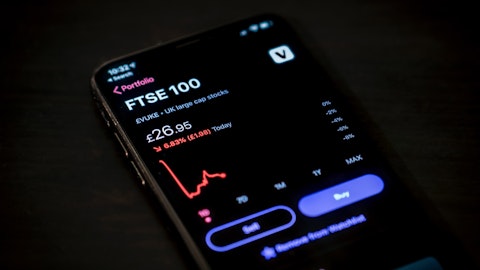Below we look at why This Billionaire Hedge Fund Manager Just Sold Off Shopify Inc (SHOP) and 4 Other Stocks. For our methodology and a more comprehensive list please see This Billionaire Hedge Fund Manager Just Sold Off Shopify Inc (SHOP) and 9 Other Stocks.
5. 10x Genomics, Inc. (NASDAQ:TXG)
Former Value of D1 Capital Partners‘ 13F Position: $239 million
Number of Hedge Fund Shareholders: 22
Daniel Sundheim’s D1 Capital Partners unloaded its entire stake in 10x Genomics, Inc. (NASDAQ:TXG) during Q1, just one quarter after first taking a long position in the company. Ken Griffin’s Citadel Investment also sold off its stake in the company during Q1. Hedge fund ownership of TXG has fallen by 50% over the past five quarters.
10x Genomics, Inc. (NASDAQ:TXG) lost $0.38 per share in the first quarter on revenue of $114.5 million, the latter narrowly topping estimates while EPS missed by a moderate amount. The company admitted to having a slow start to the year in its Q1 earnings report, but is bullish on the accelerated adoption of its single cell and spatial technologies, and believes 2022 will be the most exciting year for the company yet in terms of product launches.
The ClearBridge All Cap Growth Strategy is bullish on 10x Genomics, Inc. (NASDAQ:TXG)’s dominant position in two key areas of scientific research, laying out its case for the company in the fund’s Q4 2021 investor letter:
“We also established a position in 10x Genomics (TXG). TXG is the dominant player in single-cell analysis and enjoys a duopoly in spatial profiling, two emerging areas of scientific research. Though the company is not yet profitable, we are attracted to the business’s strong gross margin profile and a high degree of visibility as consumables account for 85% of revenue. We also continue to see opportunities for investment in other disruptive areas of health care with large addressable markets, like diabetes.
4. KE Holdings Inc. (NYSE:BEKE)
Former Value of D1 Capital Partners‘ 13F Position: $342 million
Number of Hedge Fund Shareholders: 34
D1 Capital increased the size of its KE Holdings Inc. (NYSE:BEKE) more than four-fold during the fourth quarter to just over 17 million shares. The fund sold off its entire position in the Chinese real estate holding company during the first quarter however, one of several China-based stocks that it unloaded during the quarter.
Unlike many of the stocks on this list, KE Holdings Inc. (NYSE:BEKE) shares have actually beaten the market this year, losing “only” 9% of their value. The first quarter was a rough one for the stock however, as it lost 37% of its value on weak Q4 results and concerns about the rampant lockdowns in China, which have stunted the country’s GDP.
KE Holdings Inc. (NYSE:BEKE) has bounced back in Q2 however, delivering a much more promising Q1 earnings report in which it handily beat estimates, pulling in Adjusted earnings of $0.08 per American depositary share and revenue of $1.98 billion. The Chinese government has also begun relaxing its lockdown measures, in addition to taking a more supportive stance on property policy following an April meeting of the Politburo.
3. Shopify Inc. (NYSE:SHOP)
Former Value of D1 Capital Partners‘ 13F Position: $414 million
Number of Hedge Fund Shareholders: 72
Daniel Sundheim’s firm was bullish on Shopify Inc. (NYSE:SHOP) in Q4, nearly doubling the size of its position in the online retail platform. It changed course in Q1 however, selling off its entire stake in the company. D1 Capital wasn’t the only fund selling out of Shopify, as hedge fund ownership of SHOP fell by 18% during the quarter.
Shopify Inc. (NYSE:SHOP) shares have been tossed into the discount bin in recent months, losing 82% of their value from peak to trough. The Canadian ecommerce company, which most notably operates a platform for online stores, is in an expansion phase that will likely weigh heavily on margins and profitability. That has proven to be a bad combination with investors given the current bearish state of the tech market. JMP Securities slapped a ‘Market Perform’ rating on Shopify this month, with no price target, stating that the company provides a best-in-class service and should continue to grow its market share.
The Polen International Growth Fund believes Shopify Inc. (NYSE:SHOP) was trading at compelling valuations in Q1, which prompted the firm to buy more shares, as it outlined in its Q1 2022 investor letter:
“We added to the Portfolio’s position in e-commerce company Shopify in the first quarter after a sharp share-price decline. This brought the Portfolio’s weighting in the company to 2%. We believe Shopify provides a uniquely positioned platform, and we like the company’s strategy of continuing to invest in its business in an effort to strengthen its competitive advantages. The market’s affinity for businesses like Shopify may have changed, which created an opportunity for us to build our position in the company at what we believed to be compelling valuations.”
2. JD.com, Inc. (NYSE:JD)
Former Value of D1 Capital Partners‘ 13F Position: $889 million
Number of Hedge Fund Shareholders: 59
Hedge fund ownership of Chinese ecommerce giant JD.com, Inc. (NYSE:JD) hit a three-year low in Q1 after several funds sold off their stakes in the company. D1 Capital was one of the funds to unload its former position in the company, which was valued at nearly $900 million at the end of 2021. Hedge fund ownership of JD is down by 36% since peaking in the first quarter of 2020.
JD.com, Inc. (NYSE:JD) shares have rebounded by 50% since bottoming out on March 14 and have nearly clawed their way back to even for the year. JD.com has plans to enter the on-demand food delivery space, where it would face competition from Alibaba Group Holding Limited (NYSE:BABA) and Meituan. The company could leverage its existing logistics arm, which it also uses in relation to some of its other deliveries, to maximize the new endeavor’s productivity.
Benchmark analyst Fawne Jiang has a ‘Buy’ rating and $106 price target on JD.com, Inc. (NYSE:JD), which was recently lowered from $117. The analyst’s sum-of-the-parts valuation of the company values JD Retail at $79 per share, the company’s net cash at $16, and its Health and Logistics divisions and $7 and $4 respectively. Jiang noted that while Covid has caused some short-term setbacks that are impacting the company’s Q2 forecasts, its fundamentals remain intact.
1. Carvana Co. (NYSE:CVNA)
Former Value of D1 Capital Partners‘ 13F Position: $976 million
Number of Hedge Fund Shareholders: 48
One of the 10 Most Shorted Stocks to Watch in June, Carvana Co. (NYSE:CVNA) also hit a three-year low in terms of ownership among hedge funds during Q1, with Daniel Sundheim’s firm again featuring prominently among the sellers. D1 Capital sold off its entire stake of 4.21 million CVNA shares valued at close to $1 billion, axing the position that was its third-largest on December 31.
Carvana Co. (NYSE:CVNA) shares have been one of the worst performers of 2022, shedding 89% of their value. Short seller Marc Cohodes suggested that there was major trouble at the company given a LevFin Insights report that showed Carvana did not sell any securitized subprime loans on the ABS market in Q2, which could suggest liquidity concerns.
Wedbush analyst Seth Basham lowered his price target on the stock to $50 from $90 this month, but noted that liquidity concerns were completely unfounded, stating that the company may have simply chosen to sell its originated auto loans to Ally Bank as part of their ongoing forward flow agreement.
Here is what Saga Partners had to say about Carvana Co. (NYSE:CVNA) in its Q1 2022 investor letter:
“I first wrote about Carvana in this 2019 write-up. I initially explained Carvana’s business, superior value proposition compared to the traditional dealership model, attractive unit economics, and how they were uniquely positioned to win the large market opportunity.
Since then, Carvana has by far exceeded even my most optimistic initial expectations. While the company did benefit following COVID in the sense that customers’ willingness to buy and sell cars through an online car dealer accelerated, the operating environment over the last two years has been very challenging. Carvana executed exceedingly well considering the shifting customer demand in what is a logistically intensive operation and what has been a tight inventory environment due to supply chain issues restricting new vehicle production.
Shares have come under pressure following their first quarter results, which reflected larger than expected losses. The quarter was negatively impacted by a combination of COVID-related logistical issues in their network that started towards the end of the fourth quarter as Omicron cases spread. Employee call off rates related to Omicron reached an unprecedented 30% that led to higher costs and supply chain bottlenecks. As less inventory was available due to these problems, it led to less selection and longer delivery times, lowering customer conversion rates.
Additionally, interest rates increased at a historically fast rate during the first quarter which negatively impacted financing gross profits. Carvana originates loans for customers and then sells them to investors at a later date. If interest rates move materially between loan origination and ultimately selling those loans, it can impact the margin Carvana earns on underwriting those loans…” (Click here to see the full text)
For more on the latest trades made by some of the biggest hedge fund managers in the world, check out 10 Dividend Stocks to Buy According to Kenneth Tropin’s Graham Capital Management and Top 10 Canadian Dividend Aristocrats to Buy Now.
Disclosure: None.





